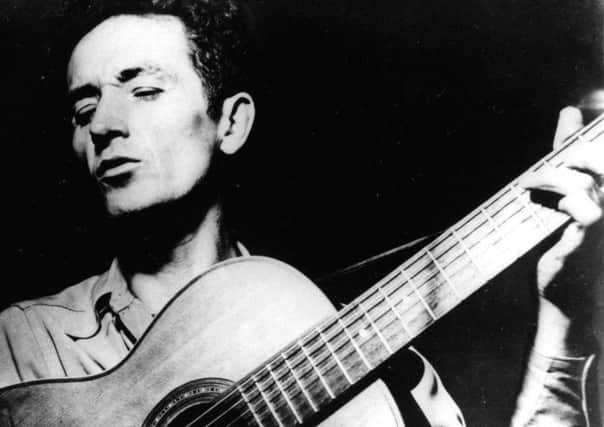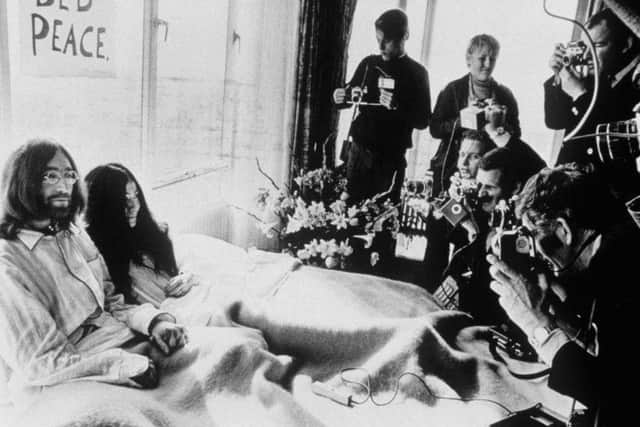Songs of protest that made the world move to a different beat


Protest songs changed the way people thought about civil rights, race, war and the environment. As the counter-culture bible Resurgence gets ready to mark its 50th anniversary, Greg Neale, editor-in-chief of the magazine - now known as Resurgence & Ecologist - lists his top 10 revolutionary songs:
This Land is Your Land
Folk singer Woody Guthrie wrote the lyrics in 1940, and subsequently added barbed comments on post-war America. A commentary on the plight of the dispossessed, it has continued to inspire. The song has its own universality, and in the era of Occupy protests and campaigns over the loss of public and green spaces, much renewed relevance.


We Shall Overcome
Advertisement
Hide AdAdvertisement
Hide AdIts origins in the early 1900s, versions by Pete Seeger, Joan Baez and others, its use by trade unionists and its adoption by America’s civil rights movement in the 1950s and 60s give it iconic status. Intensely moving when sung by a crowd, its message of hope appeals to the collective spirit.
A Hard Rain’s a-Gonna Fall
It’s 1962 and Bob Dylan fashions a brooding, apocalyptic masterpiece. When Dylan was awarded the Nobel Prize for literature this year, Patti Smith substituted for him and sang the song at the award ceremony in Stockholm, her at times nervous performance, as much as the lyrics, drawing sustained applause.


Little Boxes
Malvina Reynolds’ gentle 1962 satire on middle-class conformity was a hit for Pete Seeger the following year. A university professor reportedly said: “I’ve been lecturing my classes about middle-class conformity for a whole semester. Here’s a song that says it all in 1½ minutes.”
The Times They Are a-Changin’
Recorded shortly before the assassination of President Kennedy in 1963, Dylan’s anthem again draws on traditional folk structures. It was an early comment on growing intergenerational conflict - “Come mothers and fathers throughout the land... Your sons and your daughters are beyond your command”.
Universal Soldier
Advertisement
Hide AdAdvertisement
Hide AdWritten in 1964 by the Canadian singer Buffy Sainte-Marie, this folk song became a hit for Donovan in 1965. Its anti-war sentiments chimed with the times, and while its internal references to recent conflicts – the gas chambers of the Second World War – date it slightly, other verses have an enduring significance and universality.
Give Peace a Chance
John Lennon’s politics ranged variously, from commenting on feminist issues to those of Northern Ireland. Here, in 1969, he and Yoko Ono less controversially created a perennial peace anthem whose chorus would be echoed by anti-war demonstrators around the world.
War
Edwin Starr’s recording reached the top of the US charts. It played into America’s growing disillusion with the morass of the Vietnam, particularly among young men, notably African-Americans, likely to be called up for overseas service. This was protest and pop at their loudest.
Shipbuilding
Elvis Costello’s reaction to the realities of war in the Falklands, recorded by Robert Wyatt in 1982. It muses poignantly on the impact of coming war on depressed shipbuilding communities. The economic upturn brought by orders for new warships is offset by the realisation that the same ships may carry young men to their deaths.
Free Nelson Mandela
Advertisement
Hide AdAdvertisement
Hide AdWith its infectious rhythm and urgent, angry lyrics this song brought the campaign to free South Africa’s jailed anti-apartheid leader to millions around the world. It remains a tribute to the power of the protest song as well as to the man who became president of a multi-racial South Africa.
Resurgence & Ecologist magazine is published by The Resurgence Trust. For more details go to www.resurgence.org